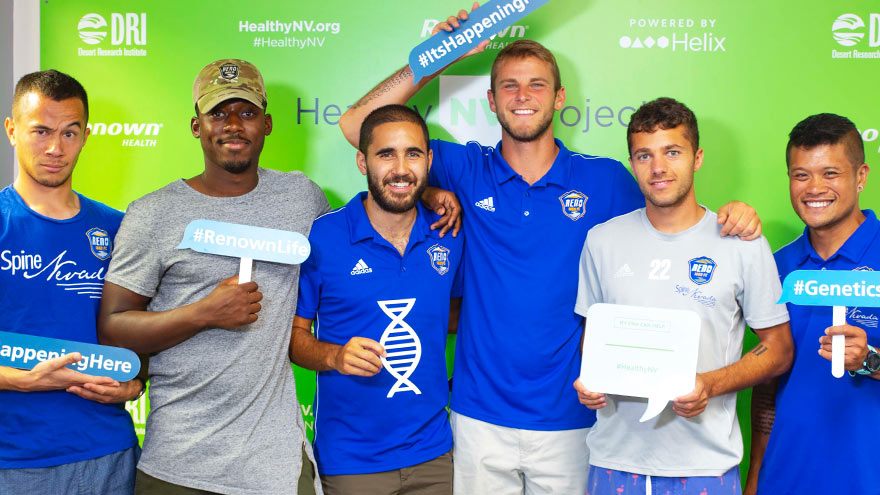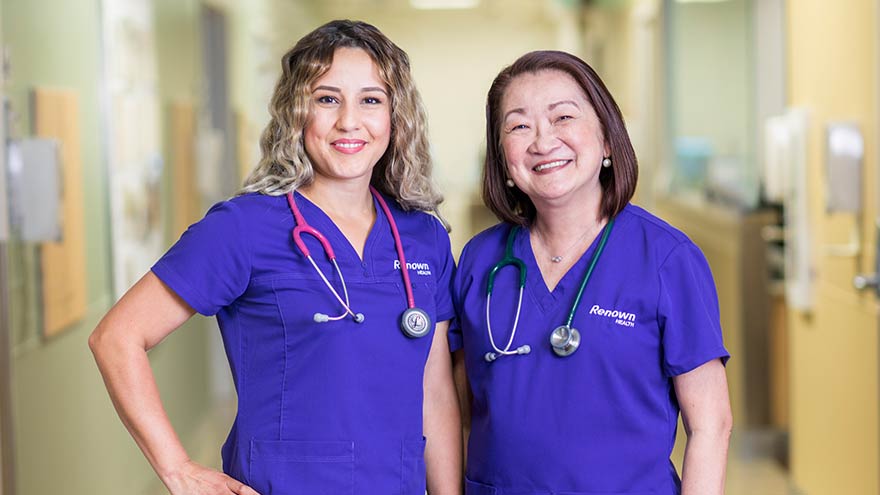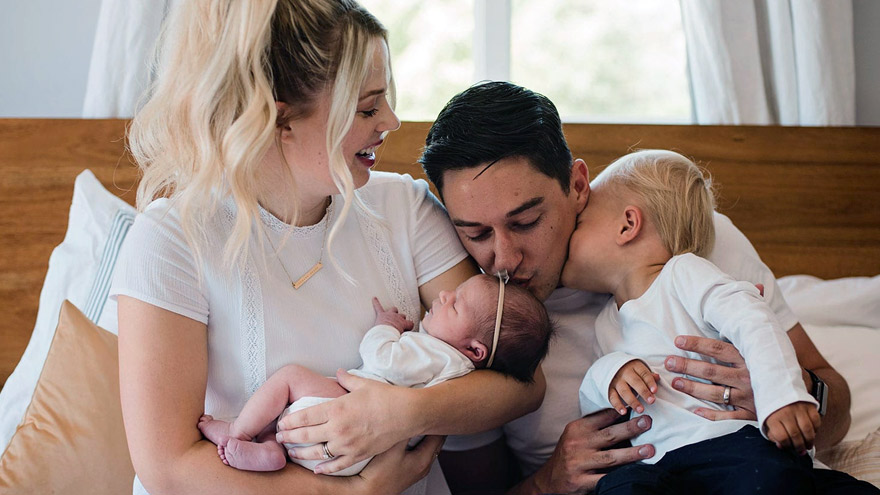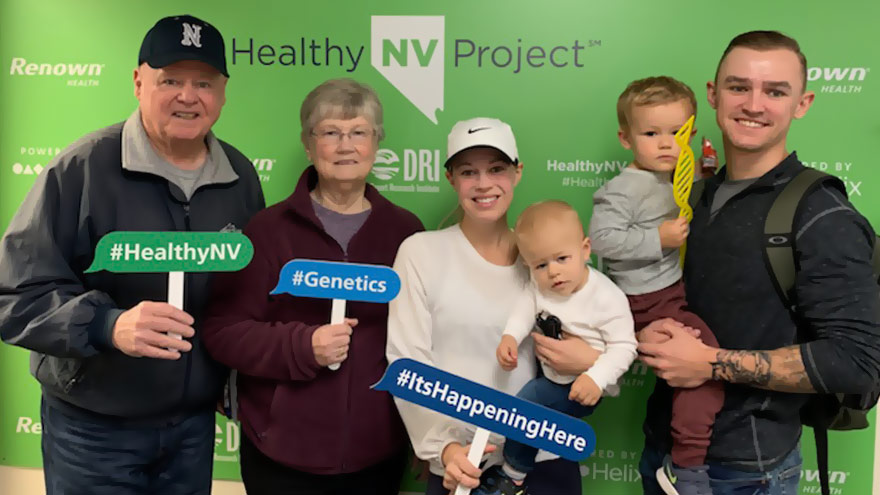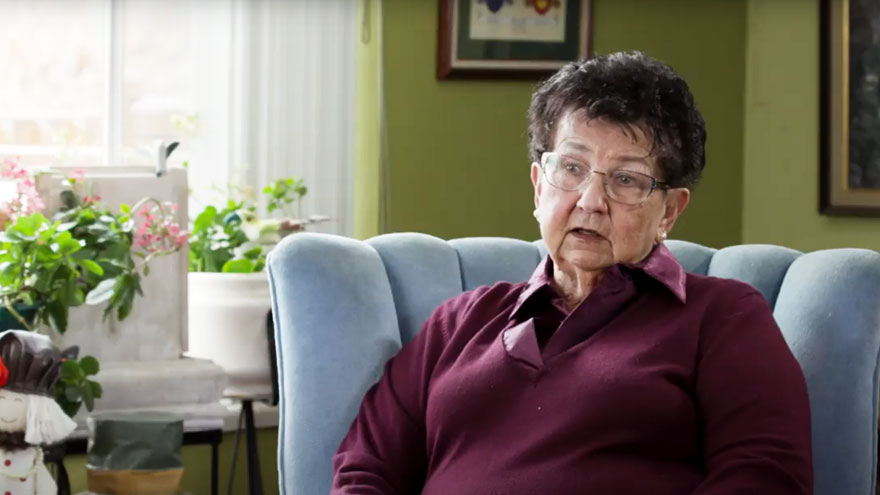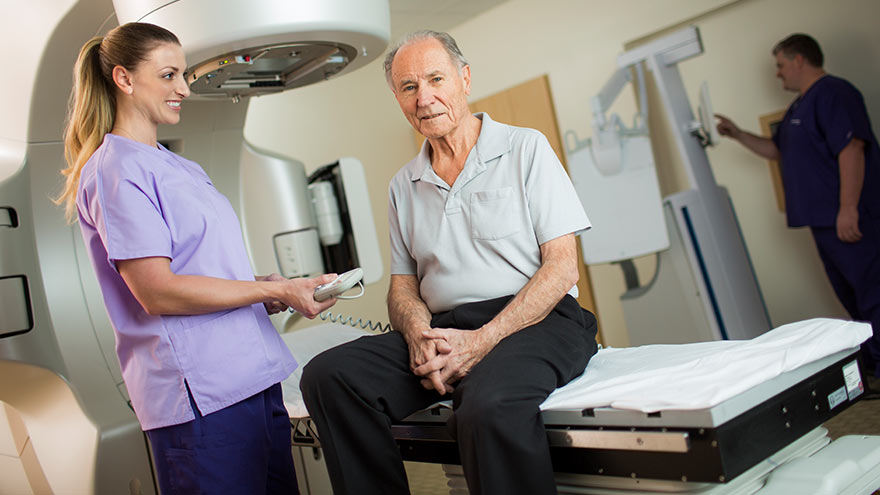Search
-
CEO Blog: Improving Health Through Genetics and Big Data
Renown Health President and CEO Tony Slonim, MD, DrPH, discusses efforts nationwide to develop a more effective and efficient way to deliver care. explains the benefits of Renown Health’s population health study with the Desert Research Institute and 23andMe.
Read More About CEO Blog: Improving Health Through Genetics and Big Data
-
How Do I Prepare for Surgery?
Renown’s team of nurses and respiratory therapists discuss what you need to know before undergoing surgery, including fasting guidelines and how to improve recovery. There are several things to know before you undergo surgery, including steps to prepare at home in advance of your procedure. Fasting Guidelines: No solid foods eight hours prior to surgery You may have clear liquids three hours before your surgery. Clear liquids include water, apple juice and lemon or lime-flavored soda water (not cola). In addition, do not chew or smoke tobacco (regular or e-cigarettes) after midnight the night before your surgery, unless instructed by your doctor or anesthesiologist.
-
True Grit Healing a Cowboys Heart
At 85, James Domingos is still enjoying life as a cowboy, thanks to a transcatheter aortic valve replacement. Always rolling with the punches when it comes to life, 85-year-old James Domingos faced his health issues with the same grit. For many years, he roped cattle for friends and rounded up horses for the Bureau of Land Management. In recent years, a pacemaker controlled the rhythm of his heart, but didn’t slow him down. “We used to be able to take walks for 15 minutes in one direction and take the dog,” says Domingos’ wife, Joy. “Then it got to be less and less.” Tests at Renown Health revealed a heart valve was nearly closed. His heart doctor, Jake Ichino, MD, FACC, FSCAI, suggested a transcatheter aortic valve replacement, known as TAVR, which repairs a heart valve without removing the damaged valve. The procedure is recommended for patients who are at high risk for open heart surgery.
-
Healthy Nevada Project: What We've Learned
As the Healthy Nevada Project expands to 50,000 study participants, researchers are sharing the health insights gleaned from the pilot phase of the project. Air pollution is a major health factor affecting northern Nevadans, according to data gathered by researchers in the pilot phase of the Healthy Nevada Project, one of the largest population health studies in the country. Today, the project — which began 18 months ago as a partnership between Renown Health and the Desert Research Institute — is expanding to add 40,000 additional participants bringing total enrollment to 50,000 Nevadans. “We are thrilled to share the first insights from our 10,000-person pilot phase and discuss how we will begin using those results to improve patient care,” says Anthony Slonim, M.D., Dr.PH., FACHE, president and CEO of Renown Health and president of Renown Institute for Health Innovation, a collaboration between Renown and DRI. Healthy Nevada Project Pilot Phase — and What Happens Next The pilot phase of the Healthy Nevada Project proved Nevadans are excited to know more about themselves and want to contribute to research that could improve health outcomes for the entire state. The pilot phase enrolled 10,000 participants in less than 48 hours and DNA sample collection from each participant was completed in just 69 working days. Based on pilot phase data, researchers have seen increased use of regional healthcare services correlated with fluctuations in air quality and so-called “bad air events” such as wildfires and atmospheric inversions. In phase two, Renown IHI will evaluate possible links between genetics and increased susceptibility to respiratory ailments. Study researchers also announced care providers and scientists will begin working on a number of clinical programs and scientific studies focused specifically on Washoe County’s high age-adjusted death rates for heart disease, cancer and chronic lower respiratory disease. Collectively, these conditions among local residents stand at 33 percent above the national rate. In the coming months, Renown IHI will begin providing advanced calcium score screenings to pilot phase participants at higher risk for cardiovascular disease. This will allow researchers to examine the link between genetics and calcium buildup in the heart. Researchers are also evaluating future studies focused on age-related macular degeneration and breast cancer risks in northern Nevada. Pilot Phase Insights Fifty percent of pilot study participants responded to a comprehensive, socioeconomic survey, which revealed: High rates of lower respiratory disease in northern Nevada and co-morbidities such as diabetes and hypertension suggest air pollution in northern Nevada is a confounding and significant factor in health. Study participants had parents who died from cancer and heart disease at a higher rate than the age-adjusted national average. Study participants exercised less than recommended by the American Heart Association and expressed interest in receiving help with behavior modification using diet/nutrition and weight loss tools. In phase two, if study participants choose to complete a follow-up survey, they will have the chance to pick an additional health and wellness app specific to their individual genetic results. Learn More To see if you are eligible to participate in the study, to sign up for study updates and for full details on the Healthy Nevada Project, please visit HealthyNV.org.
-
Why Can't I Eat Before Surgery?
If you’re having surgery on your shoulder, why does it matter what’s in your stomach? We asked Dr. Matthew Hoberg to explain more about pre-surgery directives, including fasting. If you have an upcoming surgery, your care team likely gave you instructions to fast before your procedure. But why? We asked Matthew Hoberg, M.D., medical director of Renown Surgical Services, to explain why it’s important to forgo food and drinks before surgery. Why are patients instructed to fast before surgery? Regardless of surgery type or site, we want the stomach to be empty before having anesthesia, because anesthesia can reduce your body’s ability to protect and prevent food or acids from the stomach from entering the lungs. Normally, your body is able to prevent this, but anesthesia medicines make it harder for your body to do so. When food or liquids from the stomach get into the lungs, doctors call it “aspiration.” This is rare, but can be dangerous if it does happen. Solid foods and liquids leave the stomach at different rates too. Solid food takes longer to empty from the stomach than liquids, so the time to stop eating solids (eight hours) is longer than that for clear liquids (two hours). The body has energy reserves to produce needed nutrients and fuel during fasting. Recently, studies have shown it is important to stay hydrated and have some carbohydrates in clear liquids up to two hours before surgery, so clear liquids are allowed until two hours before surgery. There are also special rules for babies and young children who need surgery. For example, you may give breast milk up to four hours before surgery. If your baby drinks formula, you should stop six hours before surgery, and all solid foods you should stop eight hours before. Your child’s doctor or nurse will give you exact instructions. What if you show up for surgery and have broken the no-eating rule? Will surgery be re-scheduled? If patients have not followed the fasting guidelines, surgery will be postponed or rescheduled due to the possible increased risk associated with not having an empty stomach. The exception would be emergency surgery that cannot be delayed in which case special precautions are taken to help prevent anything from getting into the lungs. What other pre-operative rules should be followed to the letter? All instructions given to patients before their surgery or procedure should be followed. There are specific medical reasons behind all the instructions and they are designed for safety — to minimize risks, lower complications like infections and enhance the recovery process to help patients get back to normal as quickly as possible. Also, many patients ask if they should continue taking medications before surgery. The answer is: It depends. Your doctor or nurse will tell you which medicines you should take and when. Some medicines need to be stopped before surgery. But for others, it’s important you keep taking them as usual. You may also get new medicines to take before surgery. You may be asked to take some medications before surgery as part of advanced pain management protocols. If you need to take medicine right before your surgery, you can take it with a sip of water.
-
Want to Recover from Surgery Faster? Get Moving!
To be on the move is a scary concept when you’re recovering from surgery. But did you know getting up and at ’em could be the key to a quicker recovery, post-surgery? Here’s some expert insight from Renown Surgical Services. The team at has some news for you: Rest and movement are important to prevent serious complications. Here are some tips about how to get mobile after your procedure — and why it’s fundamentally important. Tip 1: Start Simple While you’re in bed, move your legs and feet up and down. Be sure to ask the nurses to help you get out of bed and into the chair for all your meals, or walk to the bathroom when needed. If you feel up to it, take a walk in the hallways with the nursing staff. Tip 2: The Sooner, the Better This may be surprising, but too much rest is not necessarily a good thing. The old saying “You use it, or you lose it” rings very true to maintaining the strength needed to get yourself out of bed. Beginning the mobility process early in your hospital stay will not only help you maintain strength and function, it may also help you get home sooner. Though it may seem counter intuitive, lying in bed all day can delay your healing time and cause serious complications to arise, including pneumonia, deep vein thrombosis or blood clots, pressure ulcers and sometimes constipation. Tip 3: Mobilize Your Support System Getting out of bed, sitting in a chair for meals and walking around your room or hospital unit can help reduce your risk of complications. The nursing staff will help you out of bed the same day of your surgery if it’s cleared by your doctor. Tip 4: Safety First The nursing staff is here to keep you safe, so make sure you call them for assistance getting out of bed. Even if you think you can do it yourself, use your call light to notify the nursing staff you are ready to get up and move. In addition, new medications can sometimes impair our judgment, balance and safety, so it’s always better to have help even though you may not need it. This is also why you may have a “bed alarm” on, to remind you to call for help and keep you safe while you are recovering. Tip 5: Move, But Manage Your Pain Many people find that getting up and moving actually helps their pain, rather than making it much worse. Taking the right amount of medication at the right times will minimize your pain and help you to get moving. Your care team will work with you on how much pain medication is right to manage any postoperative pain, with the goal for you to be comfortable enough to be able to move and gradually increase your activity each day. Tip 6: Maintain that Momentum at Home Mobility doesn’t end once you’re discharged from the hospital. It’s key to keep moving to maintain health and function. When you first arrive home, it’s crucial to take frequent movement breaks throughout the day. Increase activity as it becomes more comfortable, and be sure to ease back into an active daily routine. If you have concerns about your mobility once home, be sure to discuss this with your doctor at your follow-up appointment. Renown Surgical Services | 775-982-3993 Ask your doctor if you have any questions about your medical condition or the specific surgical procedure planned, or contact the team at Renown Surgical Services. Learn More
Read More About Want to Recover from Surgery Faster? Get Moving!
-
One Patients Story of Survival
Thanks in part to the care provided by Renown’s award-winning team of ICU nurses, Tony Mowatt is alive, thriving and engaged. Read his story — and learn about the exclusive Beacon Award of Excellence — below. The open road. The growl of the engine. The feeling of freedom. That’s what Oakland resident Tony Mowatt was enjoying as he drove up Highway 88 toward Reno for the semi-annual Street Vibrations event. But he wasn’t expecting to hit the diesel truck — or to fly off of his bike over 100 yards, skidding onto the side of the road. He was severely injured and in the midst of rural Nevada. He had crashed just outside Centerville, Nev., and was miles away from any critical care hospital. Having the only trauma center equipped to treat his serious injuries, Tony was flown to Renown Regional Medical Center and admitted to the intensive care unit (ICU). ICU Nurses Treat Patient, Support Family Tony’s girlfriend, Tasha Klubock, was notified by his friend that he had been taken to the hospital. She immediately drove from Oakland to Reno to see Tony at Renown. Her first night there was overwhelming and scary — nobody knew if Tony was going to survive. But the nurses helped Tasha cope with the initial shock. Caring for the patient isn’t their only job — they also care for the family. “They [the nurses] just kept coming in and checking on me,” she said. “Angela was so amazing that first night. I really just bonded to her, and I remember when the shift switched, I panicked thinking about who was coming on and wanting to meet the next nurse … But they all came to talk to me — I had updates from everybody. It was just amazing.” ICU Nurses Became Family Tony spent 32 days in Renown’s Sierra ICU, surviving a serious head injury, all with Tasha by his side. He and Tasha still stay in touch with Renown nurses. “Even though this was literally one of the most hideous, craziest things to go through,” Tasha said. “There was so much hope and they became such a family to me and I still think of that time fondly because of the nurses.” “I’m alive because they wanted me to be,” Tony said. And Tony and Tasha are now happily engaged and planning their wedding. Exceptional Care: Renown ICU Nurses Win Awards Renown’s ICU nurses provide care like this every day to countless patients — it’s so second nature to them that they forget how exceptional it truly is. But it’s certainly care like Tony’s that has earned them national recognition. The American Association of Critical Care Nurses awarded the Beacon Award of Excellence to the Sierra, Cardiac and Roseview ICUs. These are the only ICUs in Nevada to obtain this honor. The Beacon Award recognizes critical care nursing teams who exemplify excellence in areas like leadership, process systems, quality care, knowledge, learning and development, excellence in patient care and superior patient health outcomes. “I couldn’t have been more proud of what we’ve done to accomplish this,” said Nick Dovedot, Cardiac ICU nurse. “It represents who we are. Just a great group of individuals who all work together as a team to make our patients get better.”
-
The Healthy Nevada Project Changed My Life: A Local Mom's Story
Read about Jordan Stiteler, a local mom who says the Healthy Nevada Project provided insights into her family’s genetic makeup — and the likely cause of her dad and great grandfather’s deaths. Now she is changing her life due to her new diagnosis of familial hypercholesterolemia, which will allow her to take steps toward preventing the same fate. Jordan Stiteler’s dad died suddenly of a stroke nearly ten years ago — at only 45 years old. His grandfather died at age 40. Now through the Healthy Nevada Project’s no-cost genetic testing, she is closer to understanding why that may have happened. And she can take proactive steps to prevent the unhealthy symptoms that often lead to a stroke and heart problems. After getting her Geno 2.0 by National Geographic ancestry report, Stiteler got a call from Renown Institute for Heart & Vascular Health Cardiologist and Renown IHI Director of Research, Dr. Christopher Rowan. “They told me that I have FH, which is familial hypercholesterolemia,” she said. “I have genetically very high cholesterol because I have a non-functioning gene that doesn’t get rid of my cholesterol like a normal body would.” Familial Hypercholesterolemia: Simple Life Changes Dr. Rowan told Stiteler it is curable with medication and a change in lifestyle. Stiteler has embraced healthy lifestyle changes by exercising more and eating healthier. “It is so important. Being a mom, I think you have so much more to live for. Having this information has changed my life.” Stiteler feels confident FH affected her Dad. “It is helping my family realize that we need to get tested,” she said. “There were big milestones that my Dad missed. He didn’t get to see either of us get married or have our children. That was huge.” She has become passionate about sharing the need to join the Healthy Nevada Project as her way of helping to prevent other families from possibly going through what she and her family did with the early loss of her Dad. In addition to FH results, the Healthy Nevada Project is returning clinical results on BRCA 1/2 (hereditary breast and ovarian cancer) and Lynch syndrome (colorectal and endometrial cancer) to consenting study participants. To sign up for the Healthy Nevada Project, go to HealthyNV.org. Join the Healthy Nevada Project Recruitment for phase two is still open. In addition to opting in to receive clinical results, participants receive National Geographic’s Geno 2.0 ancestry app at no cost. They also have the chance to pick an additional app for health and wellness after completing a follow-up survey. Learn More or Sign Up
Read More About The Healthy Nevada Project Changed My Life: A Local Mom's Story
-
Healthy Nevada Project Returning Clinical Results to Participants
The Healthy Nevada Project – a first-of-its-kind population health study combining genetic, clinical, social and environmental data – has reached another landmark milestone. The study is notifying study participants at risk for familial hypercholesterolemia, BRCA and Lynch syndrome. “I took part in the Healthy Nevada Project to find out my ancestry. I didn’t even realize the test could give me so much information,” says 29-year-old Jordan Stiteler, who was recently diagnosed with familial hypercholesterolemia (also known as FH) through the Healthy Nevada Project. “After my dad passed away suddenly at age 45, I learned I had high cholesterol but I didn’t know it was genetic and I didn’t get an FH diagnosis until last week,” Jordan explains. “I immediately changed my diet, started walking more and doing more cardio. I also set up an appointment with my primary care physician for the first time in a while. I’ve talked with my family and even strangers about testing since my diagnosis. I hope my story will inspire others to test and can save someone’s family from going through the same loss I did.” Healthy Nevada Project Notifying Patients of Familial Hypercholesterolemia Risks Jordan is among the first Healthy Nevada Project participants to receive clinical results from the genetic study led by Renown Institute for Health Innovation (Renown IHI) – a collaboration between Renown and the Desert Research Institute Foundation. This groundbreaking population health study is now reaching out to study participants like Jordan, who asked to be notified of health risks. If study volunteers choose, the project will also provide guidance on treatment and additional testing for family members who may also be at risk. The project is starting with the return of FH risks which is a genetic tie to high cholesterol. Just a few months ago, a paper in the Journal of the American College of Cardiology recommended genetic testing become the standard of care for patients with a definite or probable FH diagnosis. Jordan says she plans to have her young son tested as well. “This is the future of health; not just reacting to sick people, but a coordinated effort between innovative technologies, data-driven researchers, and responsive practitioners to deliver personalized interventions to identify, prevent and treat disease,” says Anthony Slonim, M.D., Dr.PH., FACHE, president and CEO of Renown Health and president of Renown IHI. “As care providers, we often don’t see patients until they’re already sick and that’s a difficult problem. By embracing personal genomics, we can accelerate the ability of researchers to access data and apply those learnings back to our health system sooner.” In the Months Ahead: Notification of BRCA1/2 & Lynch Syndrome Risks The Healthy Nevada Project will start notifying study volunteers at risk for other CDC Tier 1 conditions including hereditary breast and ovarian cancer syndrome (BRCA 1/2 genes) and Lynch syndrome in the months ahead. These conditions are the key focus for the Healthy Nevada Project. The reason: Because early detection and treatment will save lives, and these conditions are some of the most common. “This research allows us to look into cancer, cardiac, respiratory illness and beyond to identify underlying causes, assess real risks and eventually initiate appropriate preventive actions much earlier. Human subject research is often intangible to participants – we are treated as subjects. The Healthy Nevada Project is creating actionable information for our participants while engaging in leading-edge research on health determinants,” said Joseph Grzymski, Ph.D., associate research professor at DRI, principal investigator of the Healthy Nevada Project and chief scientific officer for Renown Health. Landmark Population Health Study Continues to Expand Since launching two years ago, the Healthy Nevada Project has quickly evolved and expanded. The pilot project enrolled 10,000 participants in just 48 hours in September 2016. In March 2018, phase two of project expanded to an additional 40,000 participants with genetic testing partner, Helix. Helix’s genomic sequencing provides participants and researchers greater depth and quality of DNA data. With this, they can gain further insights to improve health. During a recent media roundtable announcing the return of clinical results, the Healthy Nevada Project also announced plans to complete testing of 40,000 people by the end of 2018. This will bring the project’s total enrollment to 50,000 people – approximately 10 percent of northern Nevada’s population. The Healthy Nevada Project hopes to reach more than 250,000 people in its next phase. The ultimate goal is to offer genetic testing to every Nevadan interested in learning more about their genetics and health. Join the Healthy Nevada Project Recruitment for phase two is still open. In addition to opting in to receive clinical results, participants receive National Geographic’s Geno 2.0 ancestry app at no cost. They also have the chance to pick an additional app for health and wellness after completing a follow-up survey. Learn More or Sign Up
Read More About Healthy Nevada Project Returning Clinical Results to Participants
-
Local Organization Receive $250K Build Health Challenge Award
Award given to Truckee Meadows Health Communities, Renown Health & Washoe County Health District. Truckee Meadows Healthy Communities (TMHC), Renown Health and the Washoe County Health District received the BUILD Health Challenge® award, a $250,000 grant to support Caring For Reno’s Elders (C.A.R.E.) program. The award comes as a collaborative result of more than 30 local organizations submitting a proposal for the funding. Renown Health announced that the organization is matching the grant alongside other pledged funding from the community, bringing the current C.A.R.E. support to $580,000. Together the entities will focus on senior loneliness and the health issues it creates. The partners are honored that Truckee Meadows was selected as one of 18 communities to receive funding from BUILD in the 2019-2021 term. “C.A.R.E will be a community approach to enhance life quality for elders by reducing social isolation and loneliness, issues that seriously impact senior health,” said co-team leader Kindle Craig, Sr. Director Renown Institutes. “Loneliness is the root cause of many issues including suicide1 , chronic disease2 and a reduction in lifespan3 . Washoe County senior suicide rates are two and four times the national rate for those aged 65 and 85 years, respectively4 . That is unacceptable.” Sharon Zadra, TMHC executive director and co-team leader, said this project will tackle barriers to socialization such as access to affordable housing, transportation and healthcare. “We’ll bring the entire community on-board, long-term, to increase social connectedness and reduce health and mortality issues associated with loneliness by starting a cross generational ‘Kindness Epidemic,’” Zadra said. The BUILD Health Challenge is a national program focused on bold, upstream, integrated, local and data driven projects that can improve community health. The award provides funding, capacity building support and access to a national peer-learning network to enhance collaborative partnerships locally to address our community’s most pressing health challenges. The C.A.R.E team expresses special thanks to the BUILD Health Challenge for its support of this initiative. “Loneliness and isolation in our senior population leads to declines in both mental and physical health, and increased mortality,” said Kevin Dick, Washoe County District Health Officer. “We are incredibly honored to join the BUILD cohort, teaming with TMHC and Renown Health to bring long-term solutions by building a cohesive social network to improve the health of our elders.” The BUILD Health Challenge® is made possible with the support of: BlueCross BlueShield of South Carolina Foundation, the Blue Cross and Blue Shield of North Carolina Foundation, Blue Shield of California Foundation, Communities Foundation of Texas, de Beaumont Foundation, Episcopal Health Foundation, The Kresge Foundation, Methodist Healthcare Ministries of South Texas, Inc., New Jersey Health Initiatives, Robert Wood Johnson Foundation, and W.K. Kellogg Foundation. TMHC, Renown Health and WCHD have worked united for the last five years, rallying diverse partners and community leaders to influence and advocate for the region’s capacity to ensure a healthy community.
Read More About Local Organization Receive $250K Build Health Challenge Award
-
Happy and Healthy Life After Heart Valve Replacement Surgery
Watch what happens when a family’s matriarch finds out she has to have heart valve replacement surgery. Thanks to supportive cardiac care, she is now back to health and enjoying her extended family with a healthy heart. Marilyn O’Gorman has a full heart full of love: Just ask her six children, 15 grandchildren and six great grandchildren. However, in 2009, tests showed that same heart had medical issues. So her close family was by her side when she underwent heart valve replacement surgery. O’Gorman says her heart doctor, Athan Roumanas, MD, FACS, put her at ease about the surgery. “You’re very nervous — you’re scared,” says O’Gorman. “You don’t know: Are you going to come out of it? Is it going to work?” Heart Valve Replacement Surgery Comes with an Unexpected Question O’Gorman was asked to choose whether she’d prefer a pig or a cow valve — ultimately inquiring of Dr. Roumanas which one he’d choose for his own mother. “And he said, ‘Well, probably pig,'” she recalls. “And I said, ‘OK, I’ll oink for you.’ And that’s how I got that, and he did a wonderful job.” O’Gorman continues her care at the Renown Institute for Heart and Vascular Health, so she can stay heart healthy and spend her free time with the many generations of family in her life.
Read More About Happy and Healthy Life After Heart Valve Replacement Surgery
-
What Is the Importance of Having an Institute for Cancer?
What is an institute for cancer — and why does it matter that we have one right here in Reno? Here, a radiation oncologist answers those questions and more. Sadly, our community health needs assessment shows cancer is the second leading cause of death in Washoe County. But many residents may not know there is an institute for cancer right here in Reno that can care for you or your loved one after diagnosis. Dr. Michael Hardacre, a radiation oncologist with Renown Institute for Cancer is here with more. What is an institute for cancer? The way I like to think of it: An Institute has healthcare providers highly trained in patient-centered care. For example, when you have cancer, many times you’ll see a lot of doctors. A program brings those doctors together — so you really have one team working together. An Institute takes that one step further. Say there are other needs beyond the doctor’s office such as nurse navigators, dietitians, physical therapists to help you get on track, etc. An Institute really proactively thinks of the need of the cancer patient. It then makes sure all those things are available to them throughout their treatment. The term “institute for cancer” identifies a cancer program that is comprehensive and multidisciplinary in nature. For Renown, that means that we have the specialists in medical oncology, surgical oncology and radiation oncology working together with other specialists to assure that a patient has coordinated care throughout the entire treatment course of cancer care. Together with cancer prevention and diagnostics, genetic assessment, supportive care, clinical trials, and cancer survivorship, the institute for cancer provides care for the community, families and patients along the entire spectrum of cancer care. What types of cancer do you treat? We’re fortunate to be able to provide cancer treatments for all types of cancers, and we’re one of the major referral centers for northern Nevada. Most commonly, just like much of the country, lung cancer, prostate cancer and breast cancer are the most frequent we see. Our care spans brain, to neck cancer and everything in between. As an accredited comprehensive community cancer program, Renown Health provides services for all cancer types. The highest volume cancers treated at Renown are breast, colorectal, lung, genitourinary, blood and gynecologic cancers. Most treatments can be done right here in Reno, but when there are specialty needs such as stem cell or bone marrow transplantation, we partner with quaternary centers, like Stanford, to assure a smooth transition of care both to and from the quaternary center. What kinds of care and treatments are offered? We offer a wide range of comprehensive care. We treat the cancer itself — surgical, radiation oncology, medical oncology in the form of chemotherapy or pills. Also addressed: dietary needs, physical therapy and navigation through this whole process. People may be surprised by the scope and scale of the Renown Institute for Cancer. For instance, our Radiation Center has the latest technologies to treat cancers. This includes the Linear Accelerators, which are machines with treatment planning software tools. In addition to the traditional external radiation treatments provided in most centers, Renown performs specialty treatments using High-Dose Brachytherapy, a treatment with an active radiation “source” and in Brain Stereotactic Radiosurgery, assuring that patients can stay right here in northern Nevada — close to home. What does that mean for the quality of care? I think it’s always great in any environment to have external people come into your program and not only share what’s happening nationally and what we could do better, but also to validate “are you doing things at the highest level you can?” That accreditation process is just one way to give us that seal of approval. We’re lucky enough this year to get the gold award by the American College of Surgeons — its highest honor. We were honored to receive it. Why is important that you’re an accredited institute? Accreditation assures our community that quality is a top priority for us. Each of the accrediting bodies has a set of standards that identify service and quality standards. Renown Institute for Cancer has the following accreditations: American College of Surgeons’ Commission on Cancer: Full Cancer Program accreditation, standards address issues from cancer prevention/diagnosis to treatment to survivorship and/or end-of-life. Renown received the Gold Level Accreditation in 2018, the highest level of accreditation possible; American College of Surgeons’ National Accreditation Program for Breast Centers: Full Breast Center/Program accreditation, standards address issues from breast cancer prevention/diagnosis to treatment to survivorship and/or end-of-life; American College of Radiology – Radiation Therapy: Full Radiation Oncology accreditation for radiation equipment, treatment planning, treatment and treatment follow-up; and American College of Radiology – Mammography Services.
Read More About What Is the Importance of Having an Institute for Cancer?



